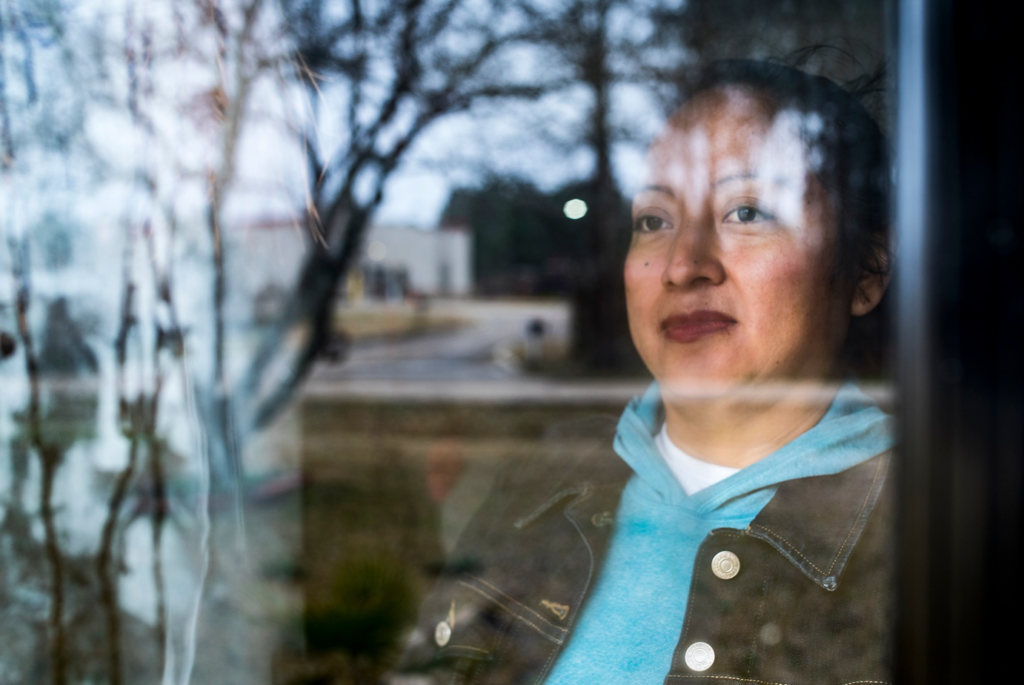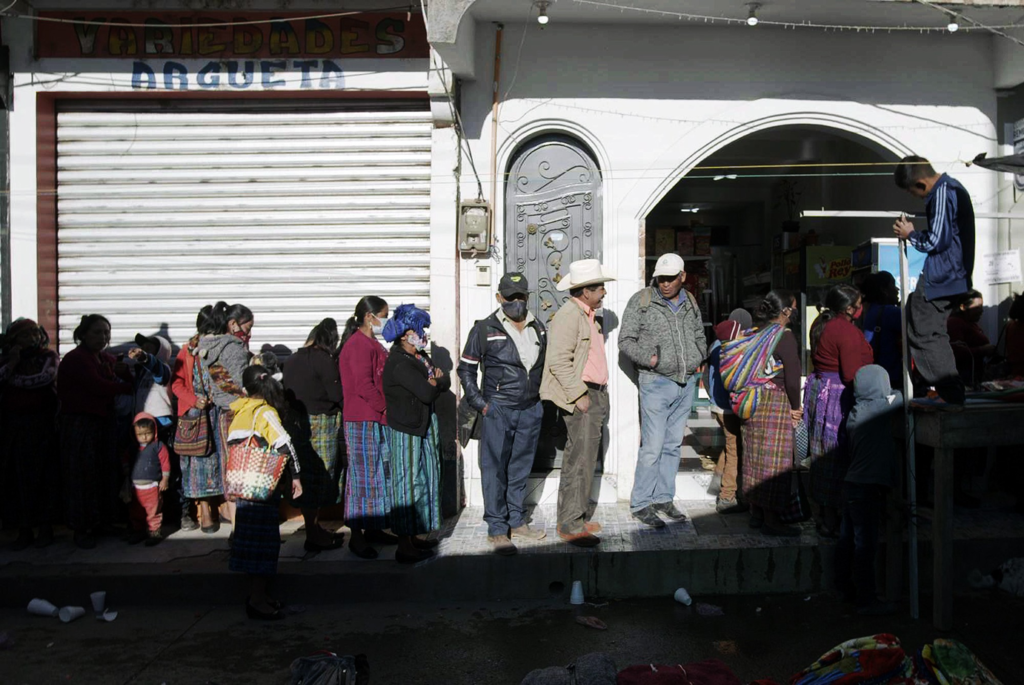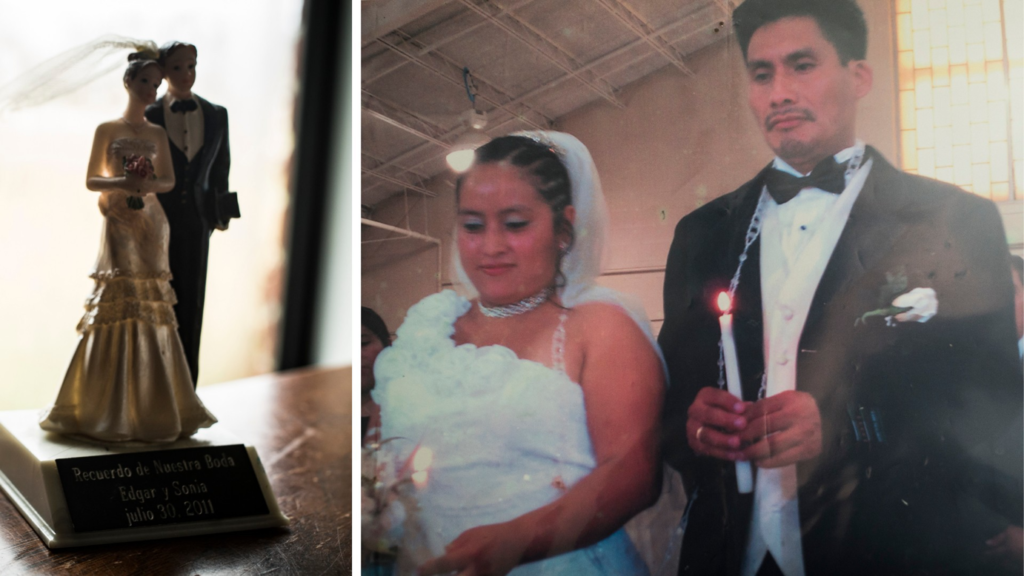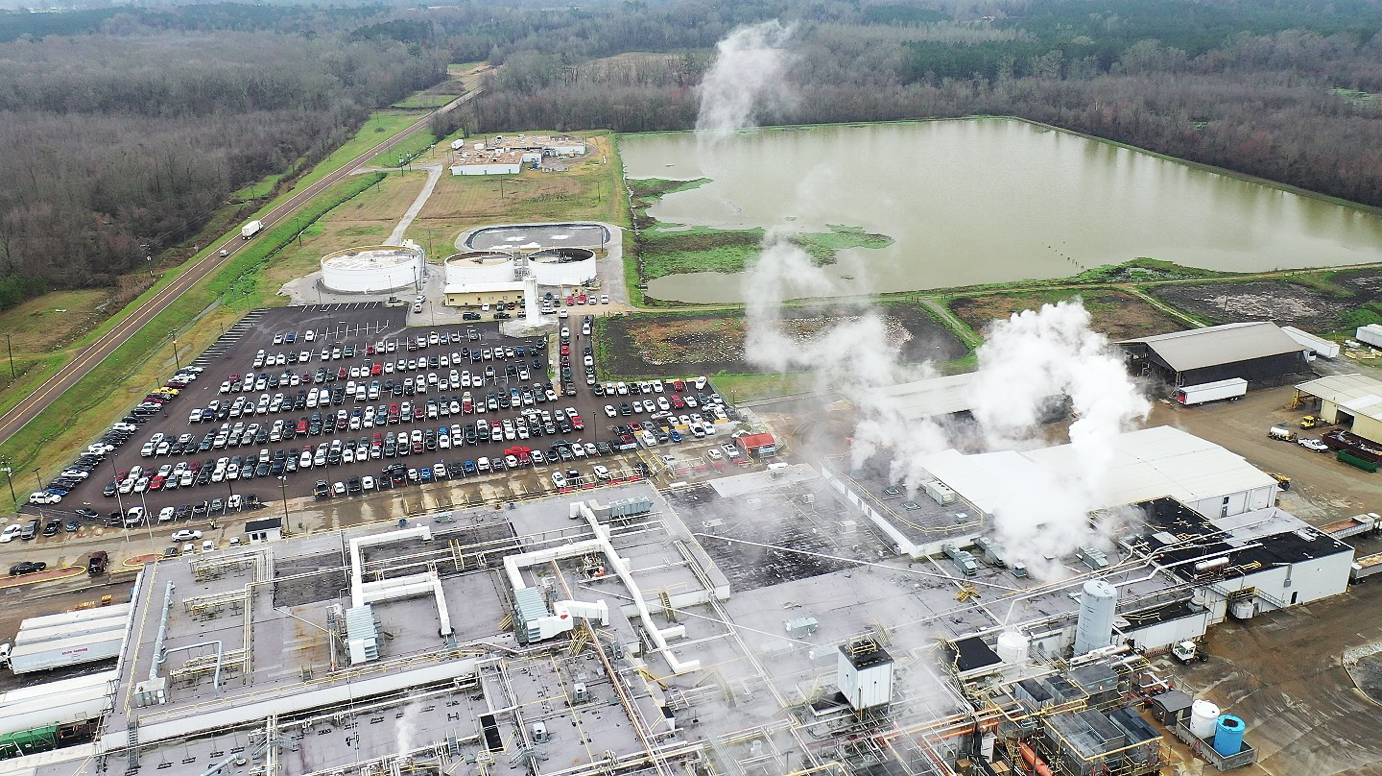The father of three, and grandfather of four, had been attempting to return to his home in Mississippi. He was killed in a massacre at the border.
CARTHAGE, Mississippi—It was 7:10 a.m. and Edgar López was coming off the overnight shift at the chicken plant when dozens of officers in tactical gear flooded the parking lot and set up a perimeter around the massive factory.
“There’s something going on. Immigration is here,” López hurriedly told his wife on the phone. Then the line went dead.
They handcuffed López with zip-ties, herded him onto a bus and took him to a National Guard airplane hangar for processing. The timing of the raid was executed for maximum impact: Agents apprehended undocumented workers coming off the night shift as well as those headed in for the day shift. Nearly 700 were arrested at seven chicken plants across Mississippi that August 2019 morning, in one of the largest workplace immigration stings in U.S. history.
A year and a half later, on January 22, López ended up shot, dumped in the back of a pickup truck along with 18 others, and set on fire. They were just 14 miles south of the U.S. border. The 49-year-old husband, father of three, and grandfather of four, had been attempting to return to his home in Mississippi following his deportation to Guatemala.
The corpses of the victims, including 15 other Guatemalans, were burned so badly that DNA evidence was needed to identify them. Twelve Mexican police officers—three of whom had received training through a U.S. State Department program—have been charged in the brazen massacre.
“He’s dead now, but for me, he died when he was arrested,” said López’s wife, Sonia Cardona. “He never returned.”
The workplace blitz at chicken plants across central Mississippi was a climax of former President Donald Trump’s “zero tolerance” approach to undocumented immigrants. Nearly two years later, the effects of the raids are still rippling across the U.S., Mexico, and Guatemala. Mass deportations, in turn, help fuel the brutally violent economy of human smuggling and extortion.
President Joe Biden has promised a reset on immigration, including a path to citizenship for millions. But upending the cycle of illegal immigration and going after smuggling networks would require a fundamental re-envisioning of U.S. policies and institutions.
Any reforms can’t undo the damage already done to the López family, and dozens of others like them around Carthage who had family members deported because of the raids. “That day everyone was crying for their families, children for their parents. It’s something you’ll never forget,” Cardona said. “It was our 9/11.”
A life in Mississippi
López was devoted to two things: family and church. But life revolved around chicken plants.
For 22 years, he had worked in chicken plants around Carthage, 50 miles away from Jackson, Mississippi, first as a janitor and then as a mechanic. At the time of the raids, he worked the night shift at Peco Foods, one of the largest poultry producers in the country, with plants, feed mills, and hatcheries sprawled across the South.
López fixed the machinery, from the belts that carry live poultry to the scales that weighed the slaughtered and deboned animals. His wife worked the day shift at a different Peco plant hanging chickens on a conveyor belt to prepare them for slaughter. Their daughter Evelin, 21, worked at yet a third Peco chicken plant, as a secretary.
“He was an awesome dad,” Evelin said. “He’s always been the person where he makes that phone call every single day making sure I’m OK, making sure my brother is OK, or my sister.”
López and his wife’s eldest daughter, Jennifer, is 24, and their son, Darby, is just 11.
They lived in a three-bedroom house with big windows on a quiet street in Carthage, a block away from McDonald’s and Burger King, and a five-minute drive from the St. Anne Catholic Church. It’s a family home: toy cars abandoned on the lawn and child-size boots splayed out at the kitchen entrance. Typical American cereals like Honey Roasted Oats, Corn Flakes, and Trix top the refrigerator.
When López wasn’t with family or at work, he was usually at church. He attended mass and prayer sessions on the weekends without fail, and was also a leader, organizing youth groups and mass weddings. He and his wife were godparents to 10 kids. Every Christmas, López and his best friend roasted venison as the two families celebrated together.

“This is the type of good neighbor I want to live over in my neighborhood. This is the type of good neighbor we all want,” federal judge Carlton Reeves would later say at López’s sentencing hearing.
But being the perfect neighbor wasn’t enough.
After the 2019 raids, around half of the 680 arrested workers were quickly released, based on the condition that they had family in the U.S. and no criminal record. But López was kept in jail, on the basis that he had been deported 22 years earlier after a prior raid at a different chicken plant — and then re-entered the U.S. just months later. That meant he could be federally prosecuted.
López wasn’t used to jail, and it quickly wore him down. During his first court hearing, he told the judge the detained workers were being deprived of sleep and food. It was a short but courageous statement: He was the only defendant to speak up at the hearing.
The same judge later deemed him safe to stay with his family while he waited for his criminal trial for illegally re-entering the country. His family paid a $10,000 bond for his release.
But before his public defender could retrieve him, ICE officers had already picked him up and transferred him to a privately-owned immigration detention facility in Louisiana, a three-hour drive from Carthage. It’s a tactic ICE frequently uses—requesting local authorities hold undocumented immigrants and then whisking them off to federal detention so the agency has the last word on whether they are released.
López tried to keep his spirits up. He asked his daughter to send him a Bible. He started a prayer group with other detained men and called his family daily. “He always tells me that he can’t eat because he’s thinking of the family and being in four walls and not having any kind of things to do like he normally does,” Evelin recalled.
In November, after three months behind bars, López decided to plead guilty to illegally reentering the country in 1998, clearing the way for his deportation.
It was a gut-wrenching decision: It meant leaving behind his life and family in Carthage with no guarantee that he would ever see them again. But the possibility of winning his case in front of a jury was slim, and if he lost, he would have to spend more time behind bars before being deported.

“I know I have no rights in this country. But I do under God,” López said amid tears at his sentencing hearing. “And I thank God for giving me the opportunity to be here.”
López’s son sat in the courtroom sobbing throughout the proceedings. Everyone knew where this was headed.
“This is the most shameful, saddest case I’ve ever dealt with,” Brad Mills, his public defender, told the court. “It is not a sin, and it should be.”
Even the federal judge charged with sentencing him seemed to agree. “I appreciate the love of my country that you’ve shown today,” Judge Reeves said, addressing López directly. “And it hurts my heart to see what this great nation is doing to you at this point in time.”
Reeves sentenced López to one day in prison, meaning he had served his criminal sentence for illegal reentry. But ICE kept him in custody. He spent the next eight months being transferred multiple times between Mississippi and Louisiana and at least four different facilities as COVID-19 ripped through jails and prisons across the country.
In July 2020, 11 months after being arrested in the raids, López was deported to Guatemala.

Carthage to Comitancillo
In López’s childhood home of Comitancillo, a small indigenous town nestled in the mountains a couple of hours south of Mexico, the new and the old collide and coexist in every way. Motorcyclists weave between horse-drawn carts; men drag squealing pigs down the street to be slaughtered next to a specialty-coffee cafe; electricity in houses is sparse, but cell phones are common.
But above all, poverty is a primary fact of life. Many families live in one-room brick houses with mud floors. Queen-size beds are crammed into every corner, and the entire family—frequently 8 or 10 people—squeezes onto them at night. Rolling green hills surround the community, but food is scarce, with rice and beans the standard diet. Two-thirds of children in Comitancillo suffer malnutrition, and many starve to death every year.
Just as noticeable as the poverty are the new concrete houses going up at every corner. They’re built with money sent from the U.S. And a large portion of migrants leaving for the U.S. are headed to Mississippi.
López was among the first Guatemalans to settle in Carthage, a 5,000-person city bracketed by McDonald’s, CVS, and Wal-Mart, and part of a constellation of towns with chicken plants and a migrant workforce. Soon after arriving, he convinced his girlfriend back home—now wife—to join him.
Today, Carthage’s population is 15 percent Latino, nearly all of them from Comitancillo.
The origins of this unusual connection date back to a chance meeting at a Florida gas station in 1994, when a group of newly arrived Guatemalans were told there was work to be had at chicken plants in Mississippi. They headed to Carthage, and then told their family and friends back home. The bosses at the chicken plants were so desperate for labor that they offered a $300 bonus for every referral an employee made. López arrived three years later, in 1997.
Working at the plants offered stability and enough money to send to family back home. But living in Mississippi also meant living with the constant threat of deportation. Immigration stops and arrests became a fact of life. ICE officers routinely showed up at chicken plants chasing specific individuals. Some agents even know undocumented immigrants by face, a longtime undocumented resident said.
Raids were infrequent, but not unheard-of. In 2008, under President George W. Bush, federal immigration officials arrested nearly 600 workers after targeting a manufacturing plant about two hours south of Carthage. President Barack Obama largely halted mass raids at workplaces, instead prioritizing people with a criminal record and newly-arrived unauthorized immigrants caught near the border, a record that earned him the nickname “deporter-in-chief.”
Then came Trump, who called Mexicans “rapists” during his campaign for president and championed a zero-tolerance immigration policy at the center of his administration. Every day brought a new threat of a raid. But people’s livelihood depended on the chicken plants, and they had no choice but to keep showing up for work. And while they were scared, nothing prepared them for August 7, 2019, which also happened to be the first day of school.
“The dreams of helping our families went in the trash in that moment,” said Salvador Salvador, a family friend and longtime resident of Carthage.
‘I’m going to fight to make it to you’
Back in Guatemala, a country he’d left 22 years prior, López tried, as he always did, to make the best of a terrible situation. He spent long hours at the church—a place he helped build with money he sent while in the U.S.—and took walks in the countryside. He cared for his 94-year-old father and called his children and wife at least once a day, and often more.
López knew the dangers of trying to enter the U.S. illegally. And he wasn’t keen to try it again. “He was afraid that he would go through that same process again—get deported or be in jail for a very long time,” Evelin, his daughter, said.
He wanted his wife to return to Comitancillo—but she was reluctant.
By January, seven months after being deported, the pull to see his family outweighed López’s fears. He especially missed his son, who wasn’t yet a teenager. “The girls are grown, but what hurts most is the little boy, who’s my only son,” he would tell his wife over the phone. “I am going to arrive. I am going to fight to make it to you.”
Crossing Mexico has also become more dangerous since López last attempted it, in the late 1990s. Under pressure from the U.S., the country has cracked down on migrants trying to traverse it, including caravans of people traveling together in big numbers for safety. But immigration flows haven’t stopped. They have just made migrants more dependent on coyotes, or human smugglers, who both exploit them and serve as a last salvation.
The smugglers López paid were well-known in both Comitancillo and Carthage, and also well-connected. David Coronado was the head smuggler, according to family members of victims as well as government officials in the town. He had unsuccessfully run for mayor in 2019 under the party “Fuerza,” a small right-wing conservative party.
Coronado’s brother, Ramiro, served as mayor of Comitancillo from 2012 to 2016. Coronado ran the smuggling business with his son, Adan, who also dabbled in government. During his uncle’s administration, Adan had a stint in the local office of the country’s Social Protection Ministry, in charge of administering transfers of cash and food to the town’s poorest residents.
It’s unclear when the Coronados began smuggling migrants to the U.S. What’s known is that by 2018, Adan started posting photos on Facebook where he talked about “express trips” to the U.S., with pictures of Guatemalan, Mexican, and U.S. flags, according to two Guatemalans living in Carthage. They said it was a clear advertising strategy to make it known he was working as a coyote.
The price tag for López’s trip: around $14,000. This is double the price from 10 years ago—a reflection of higher bribes for officials and Mexican cartels that charge money for migrants to pass through the territory they control, as well as a spike in immigration agents at the U.S. border making crossing illegally more difficult.
The Coronados asked for at least $2,000 up front and another payment when the group reached the U.S. border. The migrants would pay the balance after reaching the U.S. That kind of money is far beyond the means of most families in Comitancillo, so many borrow money from local banks at a 12 percent monthly interest rate, putting up their family’s house and land as collateral. By the time they pay back the loan, it has often doubled in price.
Reached by VICE World News, Coronado angrily rejected the claim that he or his son worked as coyotes. “I’m a victim,” he sobbed, before accusing VICE of trying to extort him and hanging up the phone.
The last text
On January 12, the second Tuesday of the month, López joined the group of migrants heading north, including at least 12 others from the area, most of them in their teens and early 20s. Several of them were dropped off by their parents, as if heading to school. At least six were planning to join family members in Carthage.
The following morning, at 3 a.m., they crammed into two SUVs and headed north, to Mexico. They carried backpacks with a change of clothes but no food. The coyotes provided that.
Throughout the trip, López called and texted his wife and children—that it was cold outside where he was walking, that it was a beautiful day. Others in the group checked in from Tuxtla, Puebla, and San Luis Potosí, as they made their way north.
As the group neared the U.S. border, López called his wife on video. He said his two daughters were grown, but to please watch over their 11-year-old son. “His voice was different—it wasn’t his normal voice. It sounded very sad,” Cardona said.
The morning of the massacre, on January 22, he texted his daughter Evelin shortly after 7 a.m. to tell her he was close to the Rio Grande River. “Where at?” Evelin texted back. But he never responded. It was the last time she heard from him.
Sometime in the next hour or two, the group López was traveling with ran into trouble. They were traversing one of the most dangerous parts of Mexico’s most perilous state—Tamaulipas—the scene of bloody battles for control between the Gulf Cartel and the Cartel of the Northeast, an offshoot of the now-defunct Zeta cartel.
Their charred bodies were found in a pickup truck in Santa Anita, Tamaulipas: the 13 Guatemalans from Comitancillo, three from another part of Guatemala, one unidentified person, and two Mexicans, believed to be cartel members transporting the migrants. Among the victims was Adan, the smuggler. His father, David Coronado, called some of the victims’ families to tell them their loved ones were dead.
Twelve Mexican police officers have been charged with homicide in the massacre, raising as many questions as answers. Among the theories is that the officers fired on the group thinking they were cartel members, and after realizing their mistake, killed them all, and burned their bodies to hide the evidence. Another is that they were working for one of the cartels and shot the group in an effort to damage their rivals and wrest control of the region.
Tamaulipas’ state attorney general said evidence showed that the crime scene had been tampered with—no bullet casings and ammunition were found — although the truck carrying the bodies had 113 bullet impacts. The prosecutor also cited discrepancies between the officers’ statements and the first reports filed after arriving at the scene.
Three of the charged officers had “received basic skills and/or first-line supervisor training” through the State Department’s Bureau of International Narcotics and Law Enforcement Affairs, according to the U.S. Embassy in Mexico. The agency’s mission statement is “to keep Americans safe by countering crime, illegal drugs, and instability abroad.”
“The training of these individuals took place in 2016 and 2017 and were fully compliant with Leahy vetting,” the embassy said, referring to a law barring U.S. aid to human rights violators.
The massacre was met with a mix of indignation and numbness in Mexico, where heinous acts of violence have become uncomfortably commonplace and police corruption is seen as a given. In 2010, in one of the most well-known cases, 72 migrants trying to reach the U.S. were hauled from buses and murdered. Mexican police helped the Zeta cartel carry out the massacre, according to Mexico’s attorney general’s office.
‘I have no words’
In Carthage, the traces—and absence—of López are everywhere. Little figurines depicting him and his wife the day they were married, a woven bracelet he made for her while detained, family photos on the walls. A man recently showed up at López’s house to mow the lawn. His 4-year-old grandson ran to the door, mistakenly thinking it was his grandfather.
His family has now set up an altar in the living room for him, with a big picture of him, and several candles. The candles have been burning especially quickly—perhaps a sign, Evelin said, that his soul isn’t at rest.
In the year and a half since the raid, López has missed big life events. Evelin got married when he was still in detention; he wasn’t there to walk her down the aisle. Instead, he called her from detention to tell her congratulations. She also had a second daughter—he was desperate to meet her. He will miss his son graduating from junior high.
But the hardest thing, Evelin says, is waiting for the daily phone call from her dad that doesn’t arrive. She tries to be strong for her mother and kids, but when she’s alone, the tears come uncontrollably.
“All the cruelty that they did to him in the U.S., it’s hard for me to realize how my dad went through getting shot, getting burned. I have no words to explain or express myself.”
López’s family isn’t the only one grieving. The connection between Comitancillo and Carthage is so strong that the day after the news broke about the massacre, a high school teacher in Carthage received messages from three of his students: They all had family members killed and would need more time to turn in their homework assignments.
In Comitancillo, the family members of the victims are struggling to make sense of what happened, and worrying about how they’ll pay off the loan they took out to pay the smugglers.
And the raids that started it all—they have left a path of destruction, but mostly for the undocumented workers. More than 230 were eventually deported.
ICE defended the operation, saying that “Homeland Security Investigations’ worksite enforcement strategy focuses on the criminal prosecution of employers who knowingly hire illegal workers.”
But none of the five poultry companies targeted in the raids have been charged or even fined. Just two mid-level managers and two human resources employees have been indicted. They were charged with hiring a total of 16 undocumented workers and, in some cases, helping them forge papers, according to court records. None have been tried.
“We have always utilized the government-based E-Verify program which screens new hires through the Social Security Administration as well as the Department of Homeland Security for compliance,” Peco Foods, where López worked, said in a statement. “Our dedication to our people means creating the best work environment possible by providing them with the training, tools, opportunities, and competitive wages needed to promote their development.”
Chicken plants near Carthage continue to fill their ranks with undocumented workers. VICE World News spoke to four who make between $14 and $17 an hour hanging up to 45 chickens per minute on a conveyor belt before the birds’ heads are cut off. They’ve been hired by a subcontractor.
For López’s family, any sense of closure is a long way off, if it ever comes at all.
His remains are still sitting in a medical examiner’s office in Mexico, along with the 15 other victims from Guatemala. Mexican and Guatemalan officials have promised to expedite their return to their families. But López’s family hasn’t heard any details. Most of what they know comes from social media.
One thing is certain. Cardona will miss the burial. She can’t travel to Guatemala because she is undocumented. Instead, she hopes half of his ashes can be returned to Carthage — to his children and grandchildren, to her.
“He wanted to see his family again, but he couldn’t make it,” she said.




